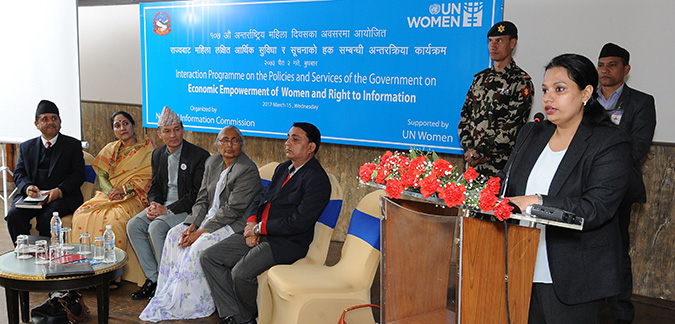Speech: Launch of “Women’s Entitlement” booklets in Tharu, Maithali, Doteli and Tamang
Date:
Speech by Gitanjali Singh, UN Women Nepal Deputy Representative at Annapurna Hotel, Kathmandu, Nepal
[Solution]
On behalf of UN Women, I am very pleased to be at the second launch of the “Women’s entitlements” booklet on economic initiatives now in Tharu, Maithali, Doteli and Tamang languages. Previously this booklet was made available in Nepali and English with support of the Government Finland and Zonta International.

UN Women is privileged to partner with the National Information Commission under the dynamic leadership of Chief Commissioner Mr. Baskota and other government agencies in exploring ways that the right to information in Nepal can be best harnessed to further women’s rights and substantive equality in the country.
Information is power. It is the oxygen for good governance. The vision of the Constitution of Nepal and the globally agreed Sustainable Development Goals of “leaving no behind” can be only realized if all citizens, especially the most excluded have access to timely and relevant information to make informed choices to further their human rights and demand accountability.
Gender equality is a matter of human rights. Yet it remains the greatest human rights challenge of our time. Investing in gender equality and women’s empowerment is both the right thing to do and also the smart thing to do. Women and girls deserve nothing less.
As we celebrate International Women’s Day week and the deliberate on women’s economic empowerment in the changing world of work at the ongoing Commission on the Status of Women - it is clear achieving equality in the workplace will require an expansion of decent work and employment opportunities, involving governments’ targeted efforts to promote women’s participation in economic life, the support of important collectives like trade unions, and the voices of women themselves in framing solutions to overcome current barriers to women’s participation and representation, as examined by the UN Secretary-General’s High-level Panel on Women’s Economic Empowerment. The stakes are high: advancing women’s equality could boost global GDP by USD 12 trillion by 2025. This booklet is an important step in ensuring women are aware of their economic entitlements under various laws and policies of the Government. This information will enable them to access relevant opportunities and enable their effective participation and leadership in communities.
2030, is the end date for discrimination. By leveraging the right to information for women’s empowerment and gender equality we will move one step closer to achieving Planet 50:50 by 2030.